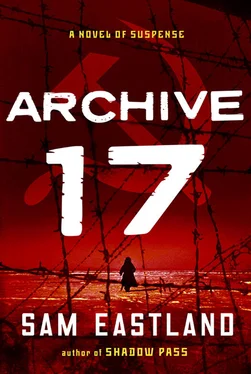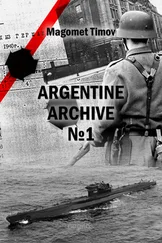Sam Eastland - Archive 17
Здесь есть возможность читать онлайн «Sam Eastland - Archive 17» весь текст электронной книги совершенно бесплатно (целиком полную версию без сокращений). В некоторых случаях можно слушать аудио, скачать через торрент в формате fb2 и присутствует краткое содержание. Жанр: Исторический детектив, на английском языке. Описание произведения, (предисловие) а так же отзывы посетителей доступны на портале библиотеки ЛибКат.
- Название:Archive 17
- Автор:
- Жанр:
- Год:неизвестен
- ISBN:нет данных
- Рейтинг книги:3 / 5. Голосов: 1
-
Избранное:Добавить в избранное
- Отзывы:
-
Ваша оценка:
- 60
- 1
- 2
- 3
- 4
- 5
Archive 17: краткое содержание, описание и аннотация
Предлагаем к чтению аннотацию, описание, краткое содержание или предисловие (зависит от того, что написал сам автор книги «Archive 17»). Если вы не нашли необходимую информацию о книге — напишите в комментариях, мы постараемся отыскать её.
Archive 17 — читать онлайн бесплатно полную книгу (весь текст) целиком
Ниже представлен текст книги, разбитый по страницам. Система сохранения места последней прочитанной страницы, позволяет с удобством читать онлайн бесплатно книгу «Archive 17», без необходимости каждый раз заново искать на чём Вы остановились. Поставьте закладку, и сможете в любой момент перейти на страницу, на которой закончили чтение.
Интервал:
Закладка:
Pekkala nodded and smiled, but the mention of friends sent a wave of sadness through his mind as he thought of Kirov and the potted plant jungle he had made of their office, the meals he had prepared each Friday afternoon, the pleas for Pekkala to buy his coats from any other place but Linsky’s. It twisted in him like a knife that he had never been able to thank Kirov for the time they’d spent working together.
Pekkala was jolted from these thoughts by one of the Ostyaks, who approached him wearing the blood-smeared pelts of the rabbits tucked into his belt. The man squatted down beside Pekkala and picked up the container he had used for boiling the meat. “You made this?” he asked, carefully shaping the unfamiliar words with his thin and sunburned lips.
Pekkala nodded.
“Where did you learn how?” asked the man.
“I taught myself. I had to. I used to live here.”
“Lived? In the camp?”
“No,” explained Pekkala, taking in the forest with a sweep of his arm. “Here.”
The Ostyak smiled and shook his head. “No,” he said. “No man lives here.”
Pekkala pressed the flat of his hand upon the pelt he had cut from the rabbit. Then he raised his arm, like a man about to take an oath, showing his palm and fingers red with the gore of the dead animal. “Do you remember me now?” he asked. “I used to be the man with the bloody hands.”
For a moment, the Ostyak only stared at him. Then he made a noise in his throat, got up, and walked away. The Ostyak sat down among his friends and they began another whispered conversation, glancing now and then towards Pekkala.
He wished he could explain to them that the one man they really had to fear was nowhere near this forest.
How distant Stalin must seem to them, thought Pekkala. How safe they must feel in their hideaways out on the tundra, with only wolves and each other for company. But Stalin would learn of their betrayal, and he would bring his vengeance down upon them. Perhaps not for a year, or several years, but he would never forget. And what the Ostyaks could not fathom, even in their nightmares, was that Stalin would hunt them to extinction. He would tear their world to pieces, rather than let them go free.
At last, the exhaustion of the day began to overtake him. As Pekkala’s eyes drooped shut, the last thing he saw was a gust of sparks from the fire, skittering away across the snow as if some phantom blacksmith were hammering hot steel upon an anvil.
ALL NIGHT, Gramotin marched through the forest.
It was no longer snowing. The moon appeared through shredded clouds, filling the forest with blue shadows.
When the candle burned out in Gramotin’s lantern, he threw it away and pressed on, following the blurred furrows of the Ostyak sleds, which he found that he could see by moonlight.
As Gramotin scrambled through the drifts, his energy began to fade. From his pocket, he removed a paika ration he had taken from the kitchen the day before. Gnawing into the tough, gritty bread, he felt guilty. The truth was, although Gramotin stole these rations all the time, normally he never actually ate them. Instead, he would give them out to those convicts whose conduct irritated him less than usual on that particular day.
Gramotin’s reasons for handing out the bread were complicated, even to himself. In his years as a sergeant of the guards at Borodok, he had learned that the best way to rule effectively over the prisoners was to be known as a man who could, on occasion, exhibit faint signs of humanity, instead of living as a sadist every minute of his life. These acts of generosity, small as they were, gave the inmates of Borodok hope that if they did as they were told, they might, as a bare possibility, receive treatment slightly less than barbaric.
Ruling over the guards was a more complicated proposition. Kindness did not work on them. They were like a pack of dogs who would obey Gramotin as long as they felt he was more dangerous than they were. The minute they saw any weakness in him, they would either close in for the kill or else abandon him completely, as they had done back on the road.
It was the first time they had ever challenged his authority. Clearly, they did not expect him to return, or else they would never have taken such a risk. Gramotin knew that the only way to win back their respect was to do the one thing they refused to do themselves.
The fact that he might become lost did not bother Gramotin. Neither did he dwell upon the fact that the Comitati would probably butcher him when he finally caught up with their group. The only thing Gramotin cared about now, as he stumbled onward into the darkness, was his reputation.
Sedov was having a dream.
In it he was a child again, reliving the moment when his mother caught him hiding in the woodshed and eating a pot of homemade plum jam which he had stolen from the cupboard. The theft had been spontaneous and the young Sedov realized only once he got to his hiding place that he had nothing with which to eat the jam. So he used his fingers, which soon became a sticky mass of tentacles.
From the pocket of her apron, his mother whipped out the large handkerchief which she always kept ready for such occasions, licked at it ferociously, and advanced upon him, saying, “You mucky boy!”
Sedov winced while his mother scraped away the jam stains around the corner of his mouth.
“Who is going to want that jam,” she shouted, “after you have been sticking your dirty hands in it?”
“Some other mucky boy, I suppose.”
Now, in this dream, Sedov was back in the woodshed and his mother was scrubbing away at his face with her coarse, spit-dampened handkerchief. “Stop it!” he protested. “I can wipe my own face!”
Waking with a shudder, Sedov was amazed to find himself still breathing.
It was morning. The sun had come out, glistening on the ice-sheathed branches of the trees.
A large dog was standing right in front of him. It had been licking his face. It had a shiny black nose and a long, narrow muzzle which was white around the sides and brown along the top. Its ears were thickly furred and set well back on its head. It was the eyes which most impressed Sedov. They were a warm yellow-brown and looked intelligent.
The dog seemed as startled as Sedov. It jumped back and growled at him from a safe distance.
Sedov noticed three more dogs lurking about at the edge of the clearing. Then it dawned on him that these were not dogs at all. They were wolves.
“Mother of God,” he whispered to himself.
The wolf, whose raspy tongue had translated in Sedov’s dream into the handkerchief of his long-dead mother, took another step back and growled at him again, jowls quivering above its teeth.
The other wolves stepped nervously from side to side, whining as they waited to see what would happen next.
Sedov knew he did not have the strength to fight them off. He doubted he could even stand. All he could manage was to raise one hand and feebly shoo them away.
No sooner had Sedov’s hand flopped back into his lap than the wolves turned and fled into the forest. In a matter of seconds, they had vanished among the trees.
Sedov had not expected such a good result and, in spite of his predicament, allowed himself a moment of self-congratulation. It was then that he heard the creak of footsteps in the snow. Looking up, he glimpsed what appeared to be a snowman dressed in rags, struggling towards him with a rifle slung across its back.
The man stopped in the clearing. His gaze wandered from the ruins of Pekkala’s cabin, to the hoof marks of the reindeer, to the canary-yellow patches in the snow where men and animals had relieved themselves.
When he finally noticed Sedov, the man let out a cry. As he struggled to remove his rifle, he tripped and tumbled over backwards. Instead of scrambling to his feet again, he just lay there, panting clouds of vapor, overcome with exhaustion.
Читать дальшеИнтервал:
Закладка:
Похожие книги на «Archive 17»
Представляем Вашему вниманию похожие книги на «Archive 17» списком для выбора. Мы отобрали схожую по названию и смыслу литературу в надежде предоставить читателям больше вариантов отыскать новые, интересные, ещё непрочитанные произведения.
Обсуждение, отзывы о книге «Archive 17» и просто собственные мнения читателей. Оставьте ваши комментарии, напишите, что Вы думаете о произведении, его смысле или главных героях. Укажите что конкретно понравилось, а что нет, и почему Вы так считаете.











